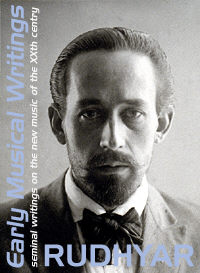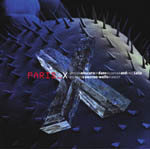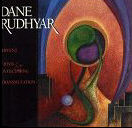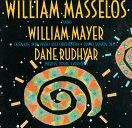 |
| Home | Bio | Art | Music | Literature | Civilization & Culture | Philosophy of Wholeness | Theosophy & Spirituality | Astrology |

ALEXANDER SCRIABIN - Precuror of the Future Synthetic Art
D. Rudhyar Christian Science Monitor May 19, 1923 In this short article of the Christian Science Monitor from 1923, Rudhyar outlines the contribution of Russian composer Alexamder Scriabin. Here Rudhyar draws attention to how Scriabin's early work seems a continuation of Chopin's preludes. A theme which Rudhyar would carry throughout his life, later stating that just as Chopin and Scriabin could be regarded as a lineage, so could Liszt and Rudhyar. The Early Musical Writings of Dane Rudhyar are made available for students of musical history and for scholarly research. Rudhyar was concerned that composers, students and scholars should not regard his earliest writings and articles - written while he was still a young man - as his most significant literary contributions to music. The reader is referred to Rudhyar's book The Magic of Tone and the articles The Transforming Power of Tone and When Does Sound Become Music for his mature and fully developed contributions. |
|
Related Articles |
|
Archived Music Articles |
|
|
Also Available Online |
|
» Rudhyar's Integration of Experience and Concepts - Music, from Leyla Raël's The Essential Rudhyar. |
|
Available Offsite |
|
Musical Works |
|
Musical Scores |
|
For scores of Rudhyar's musical works, visit the site of the American Composers Alliance. Musical scores 5 Stanzas and Granites are also available from SheetMusicPlus.com |
|
Also of Interest |

The Music of Rudhyar & Satie PARIS-X Musica Obscura Richard Cameron-Wolfe, Piano. Hear a sound clip 
Piano and String Compositions AVENT, CRISIS & OVERCOMING, TRANSMUTATIONS Marcia Mikulak, Piano and The Kronos Quartet 
An Earlier Recording of Rudhyar's Music Now on CD MASSELOS PLAYS RUDHYAR |
|
Home » Music » Articles on Music  Alexander Scribin, in spite of the efforts of some of his friends and pupils, foremost among whom perhaps Modest Altshuler and Alfred Laliberté should be named, is still very little known except to a few music-lovers scattered throughout the great cities of Europe. The cause of such a relative lack of popularity lies in the fact that Scriabin's works represent a type of music which cannot possibly appeal tonalistic to a unimaginative public. Studying the life and works of Scriabin, we can easily detect in them two great periods, linked by a short stage of transition. Up to about his thirty-third year Scriabin's music appears indisputably as the continuation of Chopin's. This must not be taken as meaning that the young Scriabin consciously followed the manner of Chopin's writing; it merely means that during the first period of his life, his attitude being somewhat similar to the attitude of Chopin, he expressed himself in a musicality necessarily analogous to that which the great romantic originated in his later years. The many preludes and poems of Scriabin's first period thus continue Chopin's preludes, and using the longings, innocence and purity, together with the passionate storms, which are so characteristic of the romantic spirit of the Polish visionary. Yet Scriabin reaches beyond the occasional sentimentality of Chopin; and a greater serenity, a subtler type of aspiration are manifest in these pages, foreboding the greater Scriabin of the later days. New Type of Harmony As a result, a new type of harmony is slowly evolved, less precise, less stereotyped than the old classical combinations of tones. The rigid mold of tonality is broken, not because of the outer efforts of a dissatisfied sensoriality (as with the early Satie), but as the result of an inner change of attitude. Such a difference is a capital one. For "whereas the purely sensorial discoveries of Erik Satie and Schöenberg led them both to an inner choas, Scriabin, proceeding always from within outward, never lost power over his tonal discoveries, never got enthralled by their sonorous newness. They, on the contrary, immediately manifested themselves as logical elements in a coherent whole, conditioned by the natural development of the musician's consciousness. Scriabin never lost himself in tonal anarchy as a result of a passionate contempt for existing tonalities. He evolved. He grew as a human being, and his music developed accordingly. Leaving classical tonalities aside as a hindrance to his own truer expression, he immediately conceived a new system, a new type of musical order, and merely changed from an old, worn-out order to a new and richer one. Thus, chaos had never any attraction for him or power over him, at a time when the essence of music was chaos and anarchy. Tonalities Inadequate Scriabin, finding tonalities inadequate for the expression of his new attitude, as it grew during the years preceding his sojourn in Brussels (1903-1908), began to constitute for his own use a new type of sonal relationship and to pave the way for a greater change as yet unrealized, for the change from the western to the eastern type of modality. In order fully to understand his work and appreciate his contribution to music, we must first of all realize that Scriabin was not, nor did he care to be, an innovator in regard to form. Not only did he not alter the fundamental ideas of formal construction as laid down in the classics, but he does not seem outwardly to have suffered from the limitations of our tempered system and from its utter artificiality. At least, he acted as if he did not. For his works from a tonal or modal point of view are utterly illogical. They are all written in a manner presupposing the natural series of harmonics. Yet they are written for the piano, the most tempered of all instruments, and practically speaking, all the complications of writing imposed by Scriabin's intellectually-conceived system are useless, as they do not correspond to any actual fact. Did Scriabin blind himself to the practical futility of his distinction between sharps, flats and double-flats? I believe not. He kept this distinction as long as he could, and he fought as hard as he could against the inevitability of atonalism and pure chromaticism. Finally, in some of his last preludes, he almost gave up. His Harmonic Ideals The harmonic ideals of Scriabin cannot be realized until the foundations of music are altogether changed. True modes built upon the harmonic series cannot be realized unless we entirely re-attune our ears and our instruments. Is this possible? Yes, but at the cost of endless years of effort and self-sacrifice. Does that invalidate the efforts of Scriabin or diminish the value of his works? Indeed not. For the lasting value of Scriabin lies in his being the first to conceive a true modal order upon which to build music, and in his daring to realize it in works; therefore, inspired by a tender yet powerful nature, he approximated the ideal which he foresaw, without transforming entirely the very units of music. Scriabin is truly the great prophet of the music of tomorrow. He serves as the bridge between the Oriental and Occidental ideals of music and art; and his situation is accordingly unique and unchallengeable. He sowed the seeds for a regenerated musicality, based no longer on fleeting impressions or intellectualized emotions. Moreover, he understood the real basis for a new synthesis of arts, a synthesis truer, deeper and more essentially human than the one Wagner realized in the last century. He left a few sketches for an immense work, a great communal drama synthetizing all arts in a grandiose manner, the fundamental conception of which he had made quite clear to his friends and correspondents. Scriabin, then, stands as a prophet of the music of the future, a seer to whose Inner gaze the plans of a great art-synthesis were revealed; a man who lived the true life of the artist with sincerity, probity and enthusiasm. He came to a decadent civilization as the promise of a culture more real, more intrinsically beautiful, ethical and true, and more fundamentally human.  Home | About | Calendar | Ephemeris Charts | Art Gallery | Library | Resources Shop | Links | Rudhyar Archival Project | Help Web design and all data, text and graphics appearing on this site are protected by US and International Copyright and are not to be reproduced, distributed, circulated, offered for sale, or given away, in any form, by any means, electronic or conventional. See Notices for full copyright statement and conditions of use. Web design copyright © 2000-2004 by Michael R. Meyer. All Rights Reserved. |